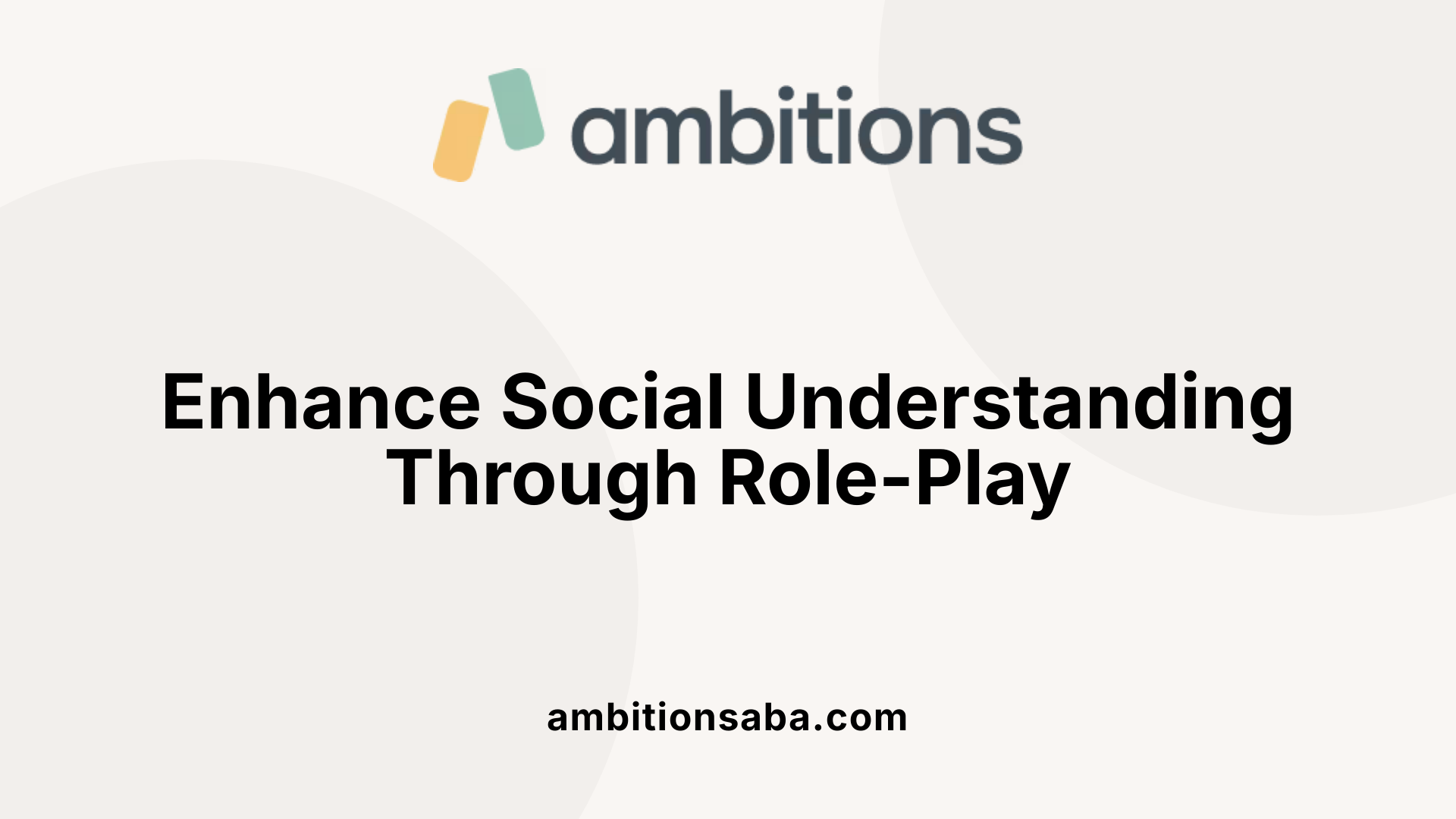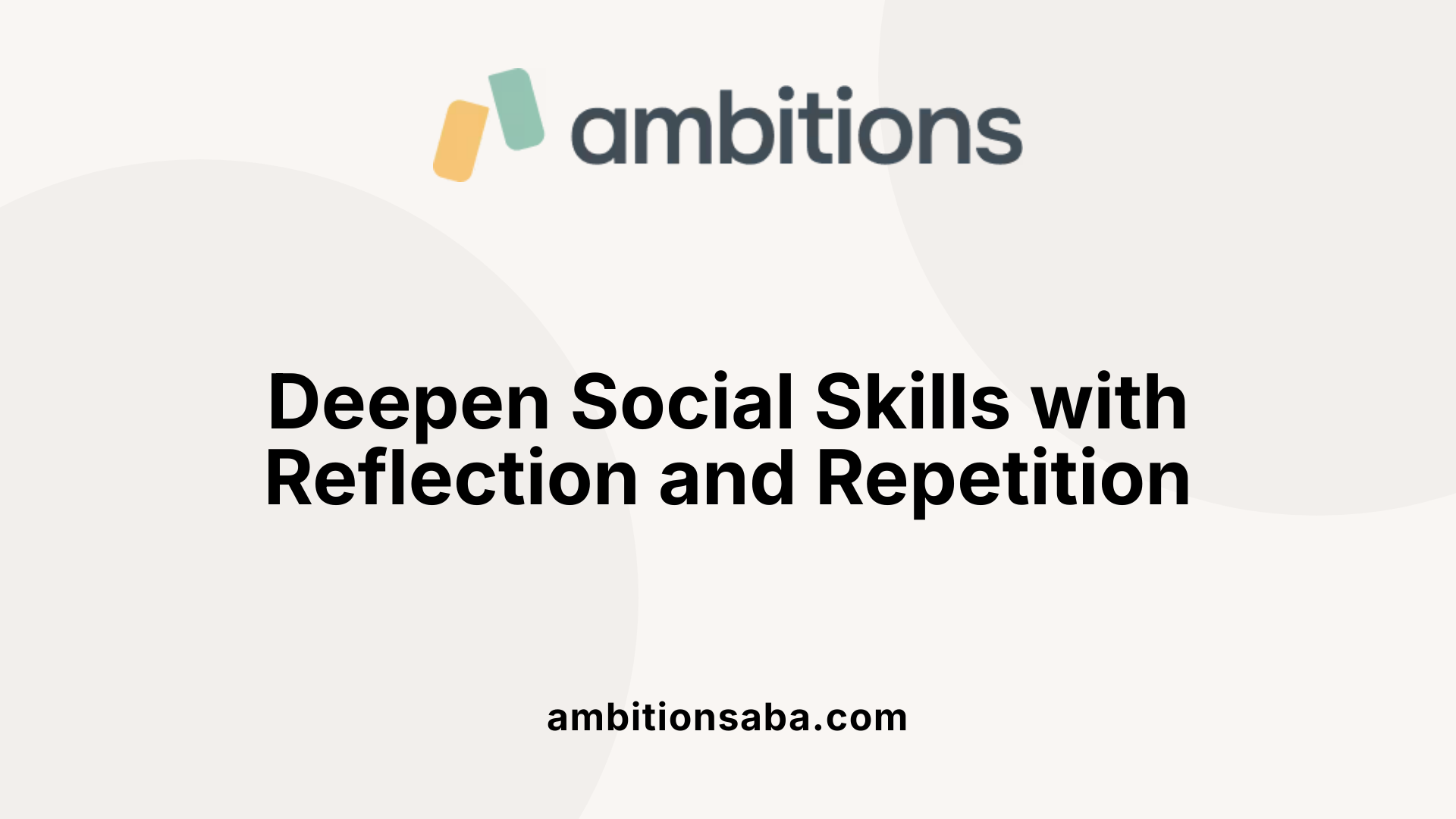Navigating Breaks Effectively in Therapeutic Settings
Unlocking the Power of Role-Playing in Social Skills Education
Role-playing is a dynamic and effective pedagogical approach that allows students to actively engage with real-life social scenarios in a safe, supportive environment. This method not only fosters essential communication and interpersonal skills but also builds confidence and emotional resilience. By simulating various social interactions, educators and parents can help children, especially those with learning differences or social challenges, develop a nuanced understanding of social cues, empathy, and collaborative problem-solving.
The Role of Role-Playing in Social Skills Development

How can role-playing be used as an effective teaching tool for social situations?
Role-playing serves as a dynamic approach to teaching social skills because it enables students to actively engage in simulations of real-life situations in a safe environment. This method helps children, especially those who learn and think differently, practice social scenarios such as giving compliments, accepting criticism, and joining new activities.
By assuming various roles, students learn to recognize social cues, understand others' feelings, and respond appropriately. These scenarios can range from casual interactions at birthday parties to classroom group work, making the learning relevant and practical.
One significant benefit of role-playing is that it encourages critical observation and peer feedback. Students can reflect on their own behaviors and understand social dynamics better. Teachers may facilitate discussions afterward to deepen understanding, helping children translate their skills into everyday life.
To maximize its effectiveness, role-playing should be well-structured with clear objectives and scenario guides. Using downloadable cards and templates, both teachers and parents can tailor activities to specific skills or situations. These exercises can be conducted in small groups, one-on-one, or even as homework, providing flexibility.
The approach also promotes important social qualities such as empathy, negotiation, teamwork, and patience. Regular practice helps solidify these skills, making children more confident in their social interactions and better prepared for real-world challenges.
What scenarios are commonly practiced in role-playing to boost social skills?
In typical classroom or home settings, students may practice scenarios such as greeting peers, resolving conflicts, participating in group projects, and handling social invitations. For example, a child might role-play attending a birthday party, practicing polite greetings, sharing toys, and thanking hosts.
Other activities include role-playing conversations at a restaurant during dinner or interactions in a store. These familiar, everyday situations help kids understand what’s expected socially and reduce anxiety about unfamiliar settings.
The use of role-playing in these scenarios can be short and spontaneous or prepared with input from children. It offers opportunities for children to explore different social roles, learn from mistakes, and improve their responses.
How does role-playing contribute to understanding complex social concepts?
Beyond basic interactions, role-play helps children explore more complex social ideas such as perspective-taking, empathy, and emotional regulation. For instance, children might act out a scenario where they comfort a friend upset over a lost toy, fostering compassion.
Activities like mimicry of facial expressions and practicing respectful responses to conflicts teach children to read and interpret social cues better. Similarly, pretend play involving authority figures teaches understanding of boundaries and respect.
Through repetition and variation of scenarios, children develop a deeper understanding of social norms and emotional responses. This ongoing reinforcement supports their ability to navigate diverse social environments independently.
| Scenario Type | Social Skill Focus | Example Activity | Benefits |
|---|---|---|---|
| Group work | Cooperation, Communication | Practice sharing supplies during a project | Builds teamwork and communication |
| Dining out | Manners, Responsiveness | Simulated restaurant visits | Reinforces etiquette and patience |
| Conflict resolution | Empathy, Negotiation | Simulating peer disagreements | Enhances problem-solving and empathy |
| Family gatherings | Emotional regulation | Role-play family event interactions | Fosters understanding of family dynamics |
Incorporating these varied scenarios through role-play helps children gradually build confidence and competence in a broad range of social settings.
Effective Strategies and Resources for Implementing Role-Playing Activities

What are effective strategies and best practices for implementing role-playing activities to teach social skills?
Implementing role-playing as a way to teach social skills can be highly effective when approached thoughtfully. Start by designing scenarios that mirror real-life social situations, like giving compliments, accepting criticism, or joining group activities. This relevance encourages students to engage meaningfully.
It’s beneficial to introduce these activities with small, simple role plays that are non-graded, helping students build confidence. Gradually, you can increase complexity by adding peer assessment and feedback, which promotes self-awareness and motivation.
Clear instructions and well-defined roles are crucial for understanding expectations. Establishing ground rules ensures a respectful environment where everyone feels safe to participate.
Guided facilitation and post-activity discussions allow students to reflect on what they learned and how they might improve. Repetition across different scenarios helps reinforce skills and encourages students to use these social strategies outside the classroom.
Using supplementary tools like video demonstrations, modeling behaviors, and social narratives further solidifies understanding and helps students remember appropriate social responses.
What resources are available for creating effective role-playing scenarios to teach social skills?
A variety of resources are accessible to aid educators in developing meaningful role-playing scenarios. Educational websites and activity guides offer downloadable scripts and templates designed for different social situations, including inclusion, empathy, and communication challenges.
Many resources include structured steps such as briefing, enactment, and debriefing, which help maximize learning outcomes. Case studies and simulation exercises aligned with curriculum standards provide authentic practice scenarios, particularly useful for students with learning disabilities.
These materials can be customized to fit specific classroom needs and support diverse learning styles. By utilizing these resources, teachers can craft engaging, relevant, and adaptable role-playing activities that effectively develop students’ social skills.
| Resource Type | Examples | Benefits |
|---|---|---|
| Online platforms | downloadable scripts, activity guides | Easy to access and customize |
| Structured templates | scenario worksheets, role cards | Ensures consistency and clarity |
| Special education materials | social stories, tailored case studies | Supports diverse learners |
| Program curricula | industry-specific simulations | Connects skills to real-world contexts |
Benefits of Role-Playing for Social-Emotional and Social Skills Development
 Role-playing is a powerful tool for fostering social and emotional growth among children. It provides opportunities to practice and understand complex social concepts like empathy, perspective-taking, and self-awareness in a safe, controlled setting.
Role-playing is a powerful tool for fostering social and emotional growth among children. It provides opportunities to practice and understand complex social concepts like empathy, perspective-taking, and self-awareness in a safe, controlled setting.
Through simulated real-life situations—such as giving compliments, resolving conflicts, or joining activities—children actively engage multiple learning styles. This approach appeals to kinesthetic, auditory, visual, and tactile learners, making the learning process more dynamic and effective.
Participating in role-play activities helps build confidence as children rehearse social interactions and receive positive feedback. It also encourages emotional regulation, as children learn to manage their feelings and navigate social pressures calmly.
The benefits extend beyond individual growth. Regular role-playing nurtures better communication skills, including active listening, clear expression, and respectful responses. These skills are essential for healthy relationships and successful teamwork.
Research indicates that role-play enhances emotional understanding and social competence by reinforcing learning through practice and reflection. It promotes higher-order thinking skills such as analyzing social cues, predicting others’ responses, and synthesizing solutions.
In summary, role-playing supports children’s social-emotional development by making learning engaging, practical, and tailored to their needs. It prepares them to handle real-world social situations confidently, fostering empathy, self-awareness, and emotional resilience.
Reinforcing Learning Through Reflection and Repetition
 Post-activity discussions are a crucial part of using role-playing to teach children social skills. After each scenario, guiding children to reflect on what they experienced helps deepen their understanding of social cues, emotional reactions, and appropriate responses. This reflective process encourages children to analyze their behaviors and learn how to improve in future social interactions.
Post-activity discussions are a crucial part of using role-playing to teach children social skills. After each scenario, guiding children to reflect on what they experienced helps deepen their understanding of social cues, emotional reactions, and appropriate responses. This reflective process encourages children to analyze their behaviors and learn how to improve in future social interactions.
Repetition of role-play scenarios across different contexts reinforces skill acquisition. By practicing multiple scenarios, children can generalize learned behaviors to real-life situations, making social skills more automatic. Repeating activities with various characters and settings ensures that children recognize social cues and responses in diverse environments.
Strategies to encourage outside-the-classroom application include involving parents and caregivers in role-play exercises at home. Providing downloadable role-playing cards and templates allows families to simulate social situations like joining a new group, greeting others, or resolving conflicts. Reinforcing social skills through consistent practice outside school facilitates long-term development.
Research supports the effectiveness of role-playing in teaching social interactions. Studies show that activities like tabletop role-playing games (TRPGs) and structured scenarios enhance social cognition, communication, and empathy. Programs like Positive Action focus on curriculum units that utilize peer mentoring, video modeling, and social narratives alongside role-play to improve social skills.
In therapeutic and educational settings, role-playing has demonstrated success with diverse groups, including children with autism spectrum disorder. Engaging in small-group, goal-oriented scenarios fosters behavior change, social awareness, and self-exploration.
Overall, integrating reflection, repetition, and external practice into role-playing activities provides a comprehensive approach to developing social-emotional skills, equipping children to navigate complex social environments confidently.
Fostering Long-Term Social Skills with Role-Playing
Integrating role-playing into educational curricula and social skills programs offers a powerful approach to nurturing lifelong social competencies. Through well-structured scenarios, guided reflection, and consistent practice, students can develop empathy, negotiation skills, emotional regulation, and a greater understanding of social cues. Resources such as downloadable scripts, templates, and interactive activities make this method accessible and adaptable for diverse learners. Evidence from research confirms that role-playing not only improves immediate social behavior but also supports the transfer of skills to real-world settings, fostering confidence and resilience. As educators continue to explore innovative, evidence-based strategies, role-playing remains a cornerstone of effective social-emotional education that prepares students for meaningful social participation throughout their lives.
References
- 8 social situations to role-play with your middle-schooler
- Social Awareness Role Playing Activity - Teaching Channel
- How to Teach Social Skills Through Role-Playing
- Role Playing | Center for Innovative Teaching and Learning
- Sample strategies for using role-play in social skills instruction
- Social Skills RP Scenarios - The Cognitive Coach
- "Using Role Play to Teach Social Emotional Skills in ... - NWCommons
- Role Playing Helps Develop Social Skills - LD OnLine
- 20 Evidence-Based Social Skills Activities and Games for Kids

